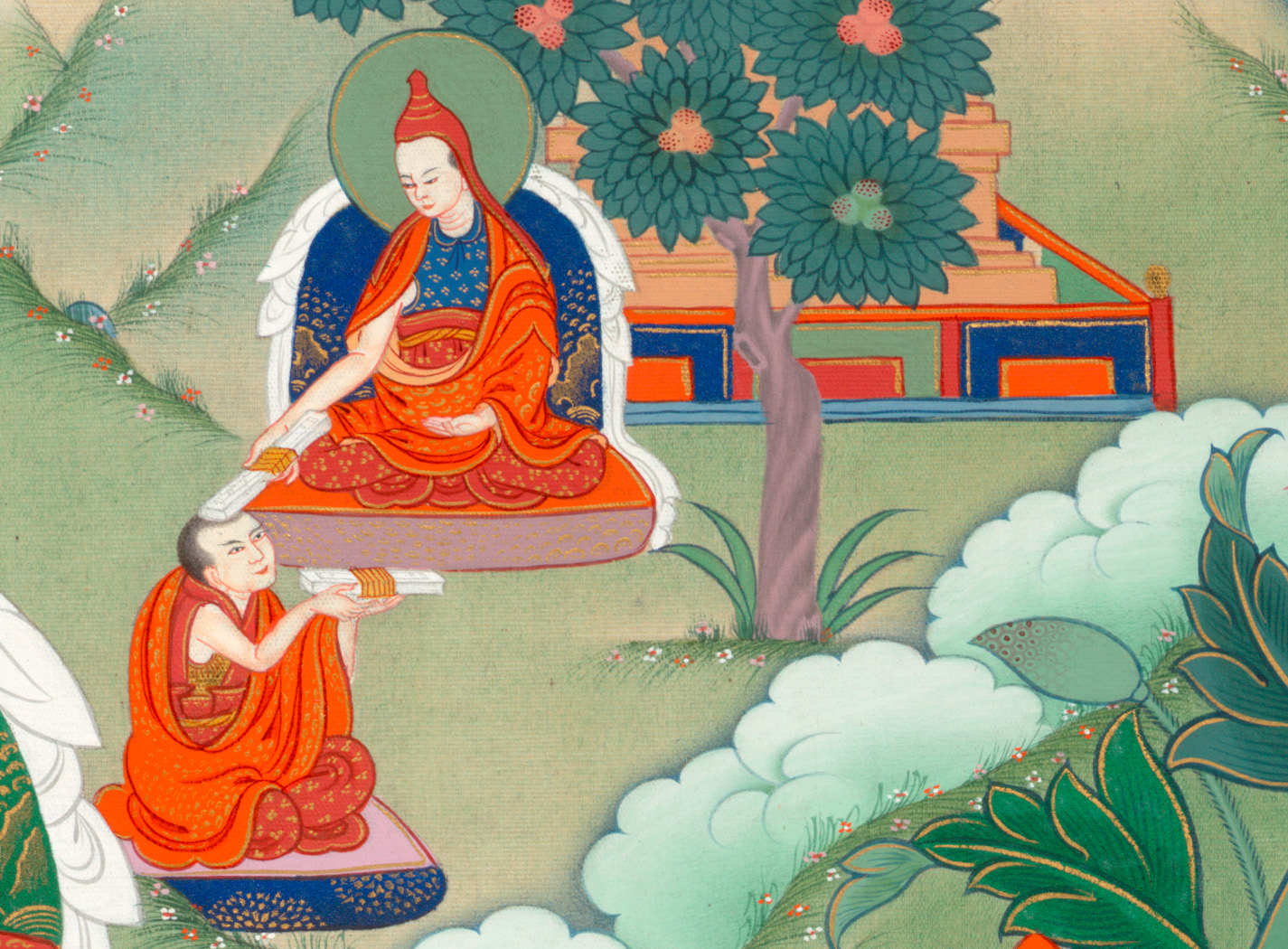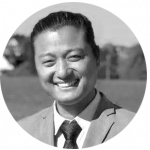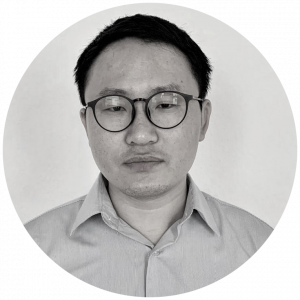KVP’s Traditional Scholars: Continuing a Tibetan Tradition of Collaboration

The transmission of Buddhism from India to Tibet was based on a profound exchange of knowledge between Indian paṇḍitas (scholars) and Tibetan lotsāwas (translators). KVP translators aim to follow this model in the modern day by working closely with traditional scholars from the Himalayan region who have trained in Buddhist philosophy and practice and have studied Khyentse Wangpo’s works in the original Tibetan language. The expertise, insights, and experience of KVP’s traditional scholars help ensure the preservation and dissemination of Jamyang Khyentse Wangpo’s wisdom in English for future generations.
Every translation KVP produces is informed by the invaluable advice of these experts, helping our translators with everything from providing reading transmissions to offering line-by-line commentary for more complex texts. We are fortunate to have three in-house expert traditional scholars as part of the translation team.
 Do Tulku Rinpoche, recognized as the reincarnation of the Fifth Raktrul Rinpoche, received extensive training in Buddhist philosophy and received an acharya degree from Dzongsar Institute in Bir. Now based in Germany, he has taught and led retreats across the globe, from India to North and South America.
Do Tulku Rinpoche, recognized as the reincarnation of the Fifth Raktrul Rinpoche, received extensive training in Buddhist philosophy and received an acharya degree from Dzongsar Institute in Bir. Now based in Germany, he has taught and led retreats across the globe, from India to North and South America.
 Lopön Sonam Jamtsho, after studying Tibetan language and Buddhism in Nepal, completed the traditional shedra curriculum at Dzongsar. He later earned an MA and PhD from the University of Hamburg, focusing on Tibetan Buddhist epistemology, and teaches at Dharma centers in Germany as well as the Milinda Program.
Lopön Sonam Jamtsho, after studying Tibetan language and Buddhism in Nepal, completed the traditional shedra curriculum at Dzongsar. He later earned an MA and PhD from the University of Hamburg, focusing on Tibetan Buddhist epistemology, and teaches at Dharma centers in Germany as well as the Milinda Program.
 Our newest scholar, Khenpo Sonam Tsewang, brings a wealth of knowledge and experience, particularly in translating complex Nyingma texts. He completed his Buddhist studies at the Central Institute of Higher Tibetan Studies in Varanasi and the Ngagyur Nyingma Institute, and was appointed Khenpo in 2011 by Karma Kuchen Rinpoche. In addition to founding the translation and editorial committees at Namdroling Monastery, Khenpo Sonam has translated several important texts into English, including How to Follow a Spiritual Master and The All-Pervading Melodious Sound of Thunder. He also serves as the English interpreter for Khenpo Pema Sherab Rinpoche, and the two travel regularly to offer teachings and lead retreats worldwide.
Our newest scholar, Khenpo Sonam Tsewang, brings a wealth of knowledge and experience, particularly in translating complex Nyingma texts. He completed his Buddhist studies at the Central Institute of Higher Tibetan Studies in Varanasi and the Ngagyur Nyingma Institute, and was appointed Khenpo in 2011 by Karma Kuchen Rinpoche. In addition to founding the translation and editorial committees at Namdroling Monastery, Khenpo Sonam has translated several important texts into English, including How to Follow a Spiritual Master and The All-Pervading Melodious Sound of Thunder. He also serves as the English interpreter for Khenpo Pema Sherab Rinpoche, and the two travel regularly to offer teachings and lead retreats worldwide.
KVP’s traditional scholars play a critical role in helping our translators and editors navigate challenging aspects of translation. By the time any KVP translator submits a draft for review, an expert traditional scholar has been consulted, and these scholars remain available to our editors for any final refinements to the translations. Through this approach, KVP follows the centuries-old tradition of collaboration between paṇḍitas and lotsāwas, which was established over a thousand years ago to bring the Dharma from India to Tibet.
This ancient process required not only language skills but also a deep, lived understanding of Buddhist philosophy. Translators like Vairocana, Yeshe De, and Kawa Paltsek, alongside Indian scholars like Śāntarakṣita and Padmasambhava, were instrumental in shaping Tibetan Buddhism during its earliest spread, ensuring the teachings were faithfully translated and integrated into the Tibetan context. This monumental effort was supported by visionary leaders like King Trisong Deutsen, who sponsored Samye Monastery as a center for translation, teaching, and practice. Thanks to their collective dedication, the wisdom of Indian Buddhism survived and flourished in Tibet, creating the foundation for the rich Tibetan Buddhist traditions we benefit from today. KVP endeavors to emulate this model as we continue to support the transmission of Buddhism globally through our translation efforts.
—KVP Translation Team
